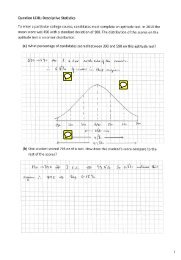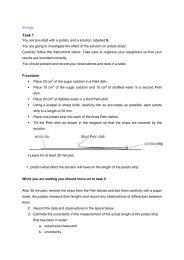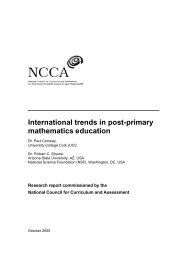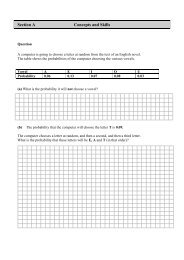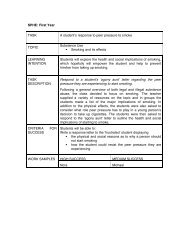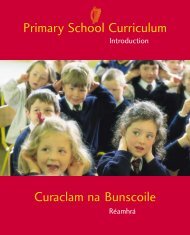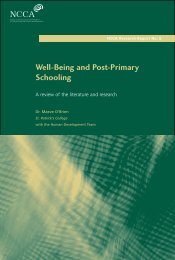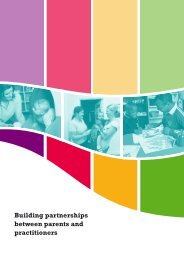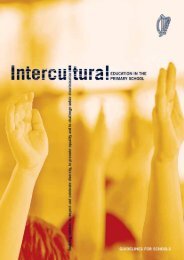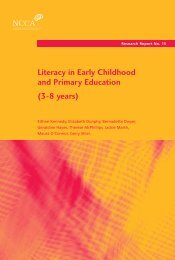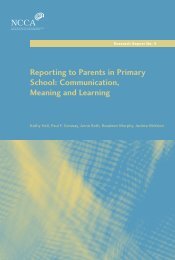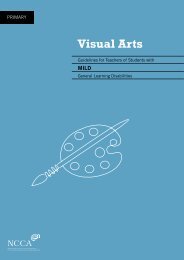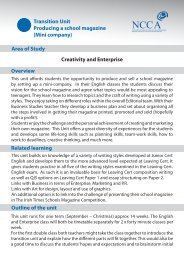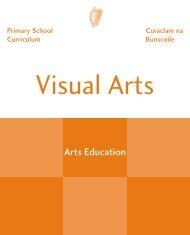Up and Away - National Council for Curriculum and Assessment
Up and Away - National Council for Curriculum and Assessment
Up and Away - National Council for Curriculum and Assessment
You also want an ePaper? Increase the reach of your titles
YUMPU automatically turns print PDFs into web optimized ePapers that Google loves.
182<br />
Example of Yes/No exercise.<br />
Read the in<strong>for</strong>mation on page 7 <strong>and</strong> then read the sentences.<br />
If the sentences are correct write ‘Yes’. If the sentences are not correct write ‘No’.<br />
1. There are five seasons in a year. No_<br />
2. There are three months in each season. Yes_<br />
3. The months of autumn are July, August <strong>and</strong> September. _____<br />
4. November, December <strong>and</strong> January are the months of spring. _____<br />
5. The months of spring are February, March <strong>and</strong> April. _____<br />
6. December 21 st , which is the shortest day of the year, is in winter. _____<br />
7. June 21 st , which is the longest day of the year, is in autumn. _____<br />
8. Christmas Day is in winter.<br />
9. My favourite season is _________.<br />
_____<br />
Example of exercise requiring pupils to tick the correct answer.<br />
Read the in<strong>for</strong>mation on page 7 <strong>and</strong> then read the sentences.<br />
Tick (✓) the correct sentence<br />
1. There are four seasons in a year.<br />
There are five seasons in a year.<br />
2. There are three months in each season.<br />
There are two months in each season.<br />
3. The months of autumn are August, September <strong>and</strong> October.<br />
The months of autumn are July, August <strong>and</strong> September.<br />
Example of gap fill exercise.<br />
Read the in<strong>for</strong>mation on page 7 <strong>and</strong> complete these sentences.<br />
1. There are ________________ seasons in a year.<br />
2. There are ________________ months in each season.<br />
3. The months of autumn are ________________ ________________ ________________.<br />
4. November, December <strong>and</strong> January are the months of ________________.<br />
5. The months of spring are ________________ ________________ ________________.<br />
6. December 21 st is the shortest day of the year. It is in ________________.<br />
7. June 21 st is the longest day of the year. It is in ________________.<br />
8. Christmas Day is in ________________.<br />
9. My favourite season is ________________.<br />
Notes<br />
Using such tasks allows pupils to see that they have successfully understood the reading text.<br />
This is not to suggest that all reading exercises in the language support classroom should be based on<br />
the above examples. Pupils at a higher level of proficiency need more challenging exercises, such as<br />
open-ended questions. The key is to grade the task so that the level of difficulty is appropriate to the<br />
pupils’ learning needs. In this way the same text can be used with a range of (graded) exercises suitable<br />
<strong>for</strong> groups at different levels of proficiency.



